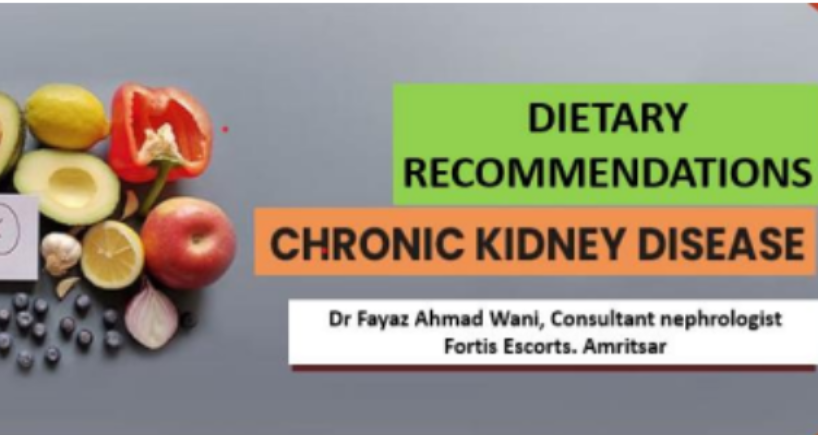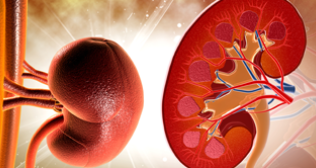
Dietary Advice to Patients with Kidney Disease -Dr. Fayaz Ahmad Wani
Chronic kidney disease (CKD) is a global health problem affecting 850 million people worldwide. One of the most important interventions in slowing down CKD progression is dietary intervention. Studies have reported a malnutrition rate of around 18–75% among CKD patients, which is associated with increased morbidities and mortality. As CKD advances, the requirement and consumption of various nutrients alter considerably. Patients may find it perplexing that dietary advice changes based on the CKD stages.
The dietary guidelines now suggest that specific nutrient restriction is redundant unless serum levels are abnormally elevated. Diet-related communication with patients and relatives must be frequent, simple, and straightforward.
Protein intake: A low protein diet (LPD), by reducing hyperfiltration at the glomerular bed, is commonly recommended for slowing the progression of CKD. Implementing this advice requires a full understanding of context and dietary habits of the patients. An Average Indian usually takes low (0.6–0.8 g/kg) protein diet daily. Avoiding common protein-containing items like pulses and milk without proper dietary advice to meet the daily requirements leads to protein energy malnutrition. Vegetarians may be allowed to continue their diet without restricting protein. The shift from animal protein-based to plant-based diet is being increasingly recommended for its pleotropic benefits on cardiovascular health. Plant-based diet could have a favorable effect on gut microbiota, and may be better for control of nitrogen balance, acid–base metabolism, and bone mineral disorders.
Dietary fat: Patients typically develop dyslipidemia when GFR begins to decline. American Heart Association (AHA) advises a total fat intake of 25–35% of total calories, monounsaturated fatty acid (MUFA) up to 20%, and polyunsaturated fatty acids (PUFA) up to 10%, SFA not exceeding 7%, trans fats at<1% of total calorie intake. The recommended combination of oils (groundnut or sesame or rice bran + mustard oil/canola oil/soybean oil) suggested by the National Institute of Nutrition
Energy Intake: The KDOQI guidelines 2020 recommend an energy intake of 25–35 kcal/kg ideal body weight in CKD patients based on age, gender, physical activity, weight, CKD stage, comorbidity, and inflammation to maintain nutritional status.
Fiber: CKD patients should not be deprived of the advantages of fiber in their diet, which also helps in preventing constipation. A daily fiber intake of 25–30 g/day or more for CKD patients may be suggested.
Dietary Potassium: Hyperkalemia develops as GFR declines. Dietary modifications are now recommended only to treat hyperkalemia and not as a preventative measure. Patients should be advised to choose low-potassium fruits and vegetable.
Phosphorus Intake: Dietary phosphorus restriction is challenging, especially for those on dialysis needing a high-protein diet. Dietary phosphorus intake should be adjusted to maintain serum phosphorus levels in the normal range. Beverages like colas, enhanced meats, frozen meals, processed or spreadable cheeses, instant foods, and refrigerated bakery products are rich in inorganic phosphorus > 90 % of which is bio-available.
Dietary sodium and salt: A low salt diet is a cornerstone in CKD management, except in salt wasting kidney diseases. Guidelines recommend a sodium intake of <2.3 gms per day.
Practical tips to reduce salt and sodium in daily diet: Gradually cutting back on salt over a few weeks is crucial when cooking and preparing meals. Meals must be made using fresh ingredients and either cooked without salt initially, then finished with the recommended amount later.
Fluid management: Urine output is usually normal in CKD stages 1 to 3. Fluid intake of 1.5–2 L/d may be prescribed except in edematous patients. Fluid recommendations, however, vary based on individual weight gain, blood pressure, residual renal function and a customized strategy is required. Teaching patients to manage fluid intake and recognize symptoms of fluid overload is advocated.
Discuss with Your Dietitian: Everything that you eat and drink directly affects your kidneys. Therefore, you should discuss the food items you should eat and the ones you should avoid. Your dietician will work with you and chalk a plan according to your unique requirements, stage of kidney disease, and any underlying health condition you may have.
Categories
Clear allMeet the doctor

- Nephrology | Nephrology
- Organ Transplant | Kidney Transplant
- Paediatrics | Paediatric Nephrology
-
8 Years
-
700



















